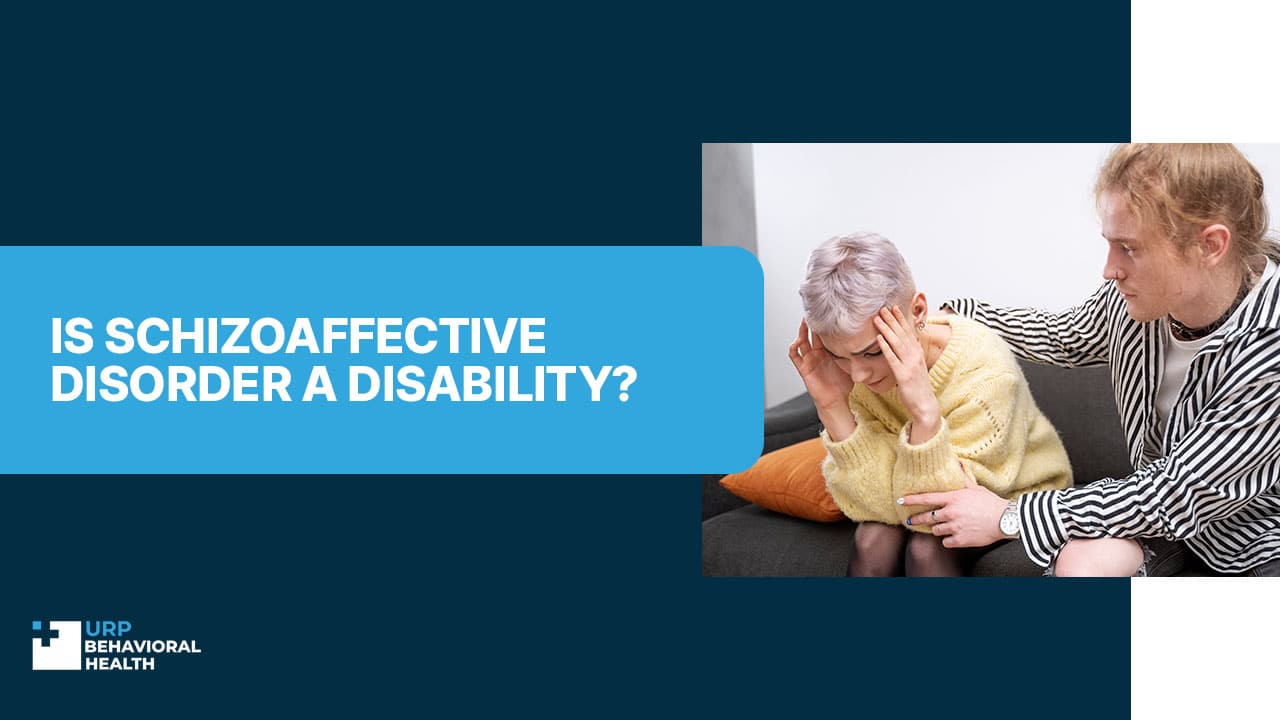
Is Schizoaffective Disorder a Disability?
To understand the roots of the problem and approve or disapprove of the statement: “Is schizoaffective disorder a disability” we first need to find out what this disease is.
Schizoaffective disorder is a complex mental disease that can affect different people depending on a variety of factors. It is happening because of some changes happening inside of the brain for many reasons. How is schizoaffective disorder characterized? Common signs of the illness are hearing, sensitive and visible hallucinations, delusions, mania, and depression.
Why is it so important to explore the disease and self-educate yourself about it? By understanding how schizoaffective disorder works and affects people’s brains it’s easier to notice the very first signs of it, seek professional help, and get the proper treatment, decreasing the risk of the development of worse symptoms.
In this article, we will discuss whether schizoaffective disorder is a disability or not, can a person with such disability get some benefits, and the treatment process for those who are struggling with this illness [1][2].
Contact our admissions team now to begin your path toward a brighter future.
Is Schizoaffective Disorder Considered a Disability?
To put it briefly, yes. Schizoaffective disorder is considered a disability under the SSA which stands for Social Security Administration in lots of countries, including the United States. Why so? Schizoaffective disorder affects people’s brain and overall health and has a strong impact on their daily routine such as work and communication, it also makes it more difficult for people to maintain emotional stability and the ability to process information.
To confirm this disability, a person’s condition should meet some specific criteria such as the inability to work due to delusions, hallucinations, thinking problems, or extreme mood disturbances [3].
Schizoaffective Disorder and Disability Benefits
Now, let’s explore the benefits a person with a schizoaffective disorder can get. There are two main programs for those suffering with the disease:
- SSDI which stands for Social Security Disability Insurance. This program requires long-term work experience and pays into the financial need.
- SSI stands for Supplemental Security Income. This program doesn’t require a long time work experience and is available for those who don’t have an extensive work history.
How do these benefits can help people with schizoaffective disorder and what is the main point of them? Those are financial programs created in order to help people with the disease cover the cost of medications, treatments, therapy, etc.
Don’t wait - confidential help is available right now for you or your loved one.
There is also one important aspect for those who want to get benefits. The application process is difficult and requires lots of documents including psychiatric evaluations, records from the hospital, and treatment plans. These records can help to understand the severity of the disorder and how strong is the impact of it on a person’s life. If those struggling with schizoaffective disorder want to get benefits, it’s vital for them to work closely with their therapists in order to ensure that all necessary information is included in their applications. Besides, it’s obvious that this process can take a lot of time and possibly decline before receiving approval, as the SSA can require multiple reviews to understand each patient’s health condition [4]. It’s also a great idea to seek help from professional advocates in this process, as they can greatly increase the chances of a successful application [6]. However, the successful result is worth it as these benefits can provide much-needed financial support for those who are unable to work due to mental health problems.
Schizoaffective Disorder Disability Approval Rate
Is the approval rate for disability related to schizoaffective disorder lower if you apply for the first time? Yes, it’s confirmed by statistics, with each new submission, the probability of success increases. Why is it so difficult? It’s mostly due to the subjective nature of schizoaffective disorder which can be sometimes difficult to prove. However, if you prepare well and collect a lot of correct documentation from your treating doctors, and also seek help from professional lawyers, the chances of approval can be high even the first time.
Even if your application was not successful for the first time, it’s vital to continue applying, as according to data from the SSA, the approval rate improves after the first appeal. Persistence is key to a successful result if you also ensure that medical records are up-to-date, and clearly illustrate the severity of the condition [7].
Conclusion
Summing up, schizoaffective disorder can definitely be a reason to get disabling as it has a strong impact on people’s lives including their ability to work and communicate. Despite the fact that it can be difficult to get a successful result after applying for the first time, it’s crucial to continue as the approval rate improves after the first appeal. Collecting medical documents from your therapist and seeking help from professional lawyers can significantly increase the possibility of getting a disability. If you or someone you know suspects and recognizes the signs of schizoaffective disorder, seeking help from professionals at URP Behavioural Health can provide efficient treatment and support for each patient. Early intervention and a thorough understanding of the disability system are key to securing the support you need to live a fulfilling life.
Our team will verify your insurance and design a plan tailored to your needs.
Sources
- [1] “Schizoaffective Disorder as a Disability”. https://pmc.ncbi.nlm.nih.gov/articles/PMC3399960/
- [2] “Evaluating Schizoaffective Disorder in Disability Claims”. https://pubmed.ncbi.nlm.nih.gov/19896334/
- [3] “Schizoaffective Disorder and Disability Approvals”. https://pmc.ncbi.nlm.nih.gov/articles/PMC6013831/
- [4] “Schizoaffective Disorder: Symptoms and Diagnosis”. https://pmc.ncbi.nlm.nih.gov/articles/PMC2646642/
- [5] “Managing Disability with Schizoaffective Disorder”. https://www.ncbi.nlm.nih.gov/books/NBK541012/
- [6] “Mental Health Disability Claims”. https://www.sciencedirect.com/topics/psychology/schizoaffective-disorder
- [7] “Disability Benefits for Schizoaffective Disorder: A Review”. https://pubmed.ncbi.nlm.nih.gov/19896334/
















